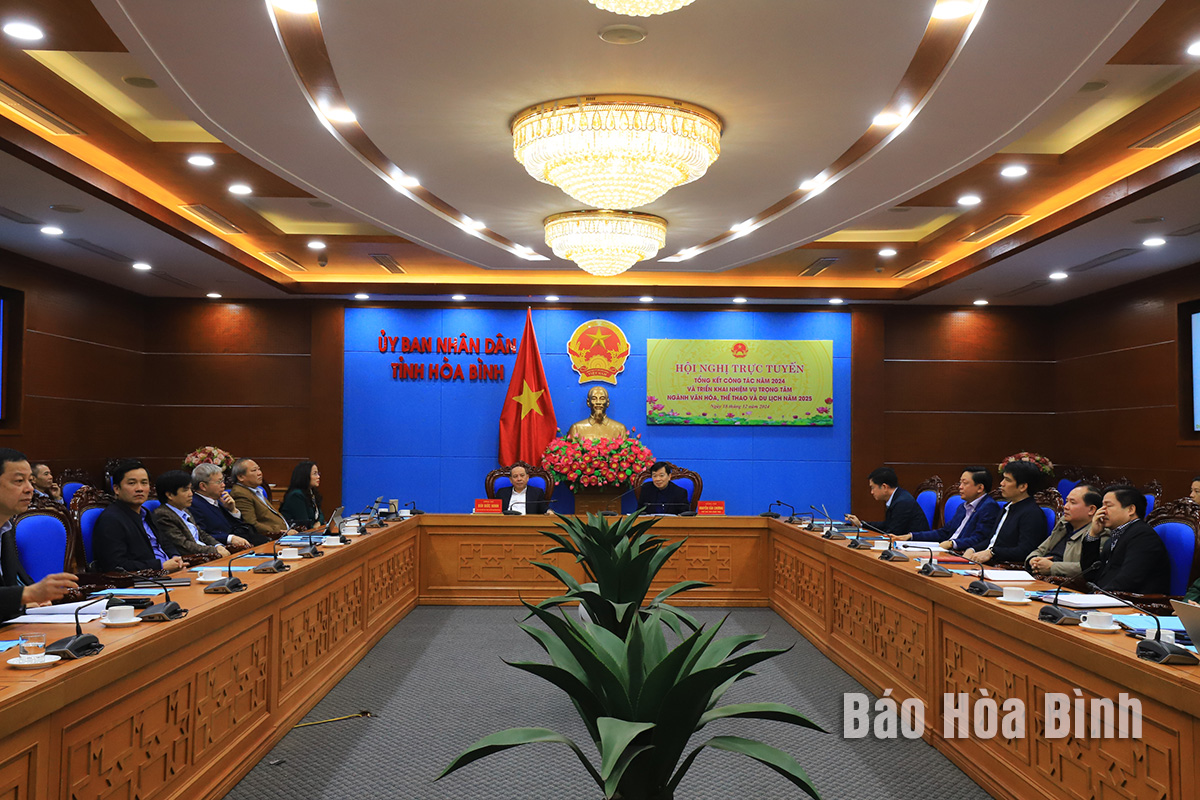
Prime Minister Pham Minh Chinh attended a hybrid conference on December 18 to review the culture, sport, and tourism sector’s performance in 2024 and launch key tasks for 2025. Standing Deputy Secretary of the Hoa Binh provincial Party Committee and Chairman of the provincial People’s Council Bui Duc Hinh, Vice Chairman of the provincial People’s Committee Nguyen Van Chuong and officials from local departments and sectors also took part in the event.
Hoa Binh
officials attend the hybrid event.
The sector demonstrated remarkable achievements
in 2024, working under the motto "dedicated - professional - skillful -
modern - united - disciplined - accelerating to realise the set goals." Particularly impressive strides have been
recorded in sports, with 1,214 international medals secured throughout the
year.
Meanwhile, Vietnam has welcomed 17.5 million
foreign tourists in 2024, up 38.9% year on year, and around 110 million
domestic visitors, up 1.6% year on year. Total revenue from tourism is
estimated at around 840 trillion VND (33 billon USD), an increase of 23.8%
compared to the same period last year.
This year, the Ministry of Culture, Sports and
Tourism has signed 11 international cooperation agreements and developed 14
plans for foreign relations activities. A multitude of exchange events and
international cooperation activities initiatives have been held successfully to
promote Vietnam's image globally and strengthened the country's international
standing.
At the event, PM Chinh spoke highly of the
sector’s efforts that have contributed to the nation's socio-economic
development despite various challenges. He asked the sector to promote its pivotal role
in revitalising the Vietnamese culture in the new era while preserving and
enhancing the distinctive values of Vietnam's culture with rich national
identity.
Looking ahead to 2025, the Government leader
outlined key priorities for the sector, including institutional reform,
administrative procedure streamlining, and increased investment in
infrastructure development, particularly in the tourism sector. He also
stressed the importance of developing specialised policies for training
cultural professionals and sports talents, while calling for resources to
develop cultural industries as well as create breakthroughs in 2025.
Phong Phu commune, Tan Lac district of Hoa Binh province, is widely regarded as the cultural heartland of the Muong ethnic group. Among its many traditional communities, Luy Ai hamlet (formerly Ai hamlet) stands out as a rare location where the customs and way of life of the Muong Bi people remain largely intact.
The Truong Kha temple festival, a distinctive cultural event held every three years in Vu Ban township, Lac Son district, returned recently with vibrant rituals and folk traditions of the Muong people. Located next to the Buoi River in the Muong Trao fields, the Truong Kha Temple is dedicated to the three Kun Dol deities, revered for teaching farming techniques, irrigation, weaving, and protecting the harvest.
The demand for spaces serving community activities of residents in various areas across Hoa Binh city has been satisfied as local cultural houses now feature modern, spacious facilities thanks to the effective implementation of Resolution No. 49/NQ-HDND issued on December 28, 2021 by the city People's Council, which approved the plan for reorganising, converting, and allocating land for the construction, repair, and expansion of cultural houses in Hoa Binh’s villages and residential areas until 2025.
At the end of May, the Hoa Binh Provincial Ethnic Arts Troupe organized a series of performances for residents in Region 2 and Region 3 communes across the province. Bringing art to ethnic communities in remote, isolated, and especially disadvantaged areas has become a meaningful activity. These are not merely artistic performances but also journeys to disseminate cultural values, enrich spiritual life, and contribute to preserving the cultural identity of ethnic minorities.



